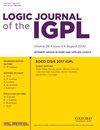Inferential knowledge and epistemic dimensions
IF 0.8
4区 数学
Q2 LOGIC
引用次数: 0
Abstract
Knowledge representation is one way to exploit expertise in a given domain by logical means. But, what kind of knowledge does one acquire from an inference (or inference on a query result over a knowledge base)? Such a question may appear awkward since the answer seems so obvious: from an inference, one simply acquires knowledge. This is undoubtedly the case when only one type of knowledge (for instance, expert knowledge) is involved in an inference. What if several types of knowledge are involved? What type of knowledge can one deduce from a plurality of knowledge types? I claim that reasoning with different knowledge concepts requires a fine-grained representation of knowledge in which every knowledge type finds a singular expression in order to avoid some epistemic equivocity associated with a coarse-grained representation of knowledge. In the first part of the paper, I revisit the Muddy Children Puzzle, which usually serves to illustrate common knowledge in dynamic epistemic logic. I try to show that this problem also shows some sort of epistemic equivocity between concepts of knowledge and, consequently, that the problem calls for some epistemological refinements concerning the representation of the types of knowledge at play in an inference. In the second part, I address this issue from a semantic point of view, and I develop a fragment of epistemic logic capable of providing a solution to the problem of epistemic equivocity.推理知识和认识论层面
知识表示是通过逻辑手段利用特定领域专业知识的一种方法。但是,人们从推理(或对知识库查询结果的推理)中获得的是什么样的知识呢?这个问题可能显得有些尴尬,因为答案似乎是显而易见的:从推理中,人们只是获得了知识。当推理只涉及一种知识(例如专家知识)时,情况无疑是这样。如果涉及几类知识呢?我们能从多种知识类型中推导出什么类型的知识呢?我认为,使用不同的知识概念进行推理需要一种细粒度的知识表示法,在这种表示法中,每种知识类型都能找到一种奇异的表达方式,以避免与粗粒度知识表示法相关的认识论等价性。在本文的第一部分,我重温了 "泥泞儿童之谜"(Muddy Children Puzzle),它通常用于说明动态认识论逻辑中的常识。我试图证明,这个问题也显示了知识概念之间的某种认识论等价性,因此,这个问题要求对推论中知识类型的表征进行一些认识论上的改进。在第二部分中,我将从语义学的角度来探讨这个问题,并发展出一个能够为认识论等价性问题提供解决方案的认识论逻辑片段。
本文章由计算机程序翻译,如有差异,请以英文原文为准。
求助全文
约1分钟内获得全文
求助全文
来源期刊
CiteScore
2.60
自引率
10.00%
发文量
76
审稿时长
6-12 weeks
期刊介绍:
Logic Journal of the IGPL publishes papers in all areas of pure and applied logic, including pure logical systems, proof theory, model theory, recursion theory, type theory, nonclassical logics, nonmonotonic logic, numerical and uncertainty reasoning, logic and AI, foundations of logic programming, logic and computation, logic and language, and logic engineering.
Logic Journal of the IGPL is published under licence from Professor Dov Gabbay as owner of the journal.

 求助内容:
求助内容: 应助结果提醒方式:
应助结果提醒方式:


